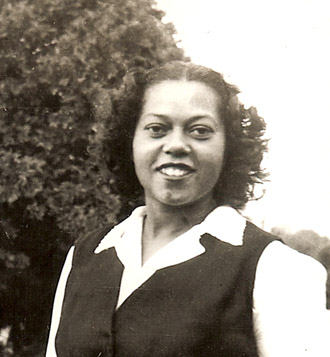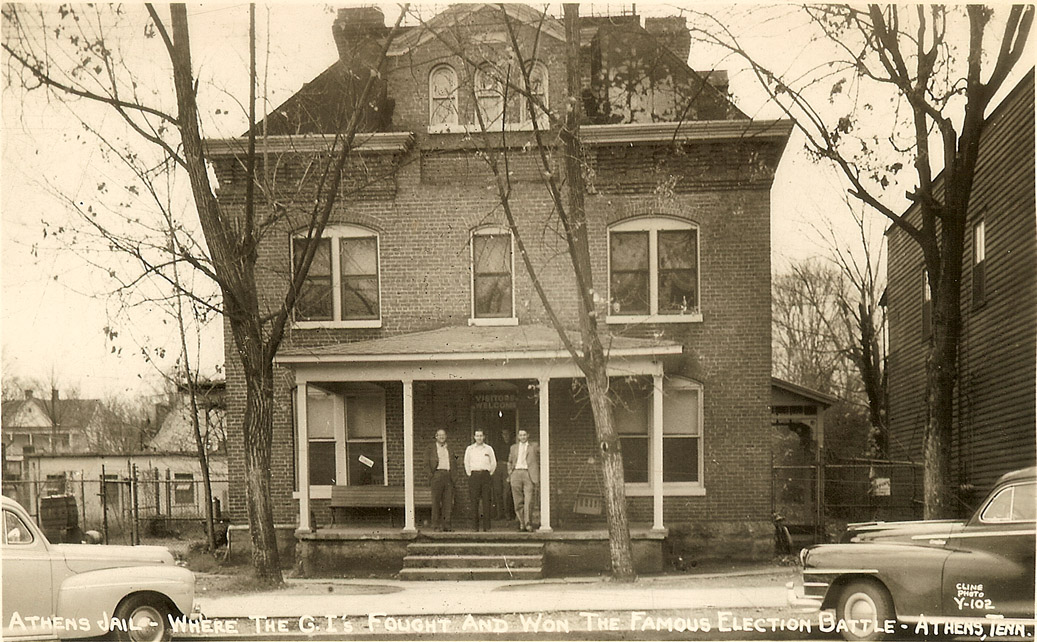
In 1946 there was a pitched battle between the corrupt local government and WW2 veterans in Athens, Tennessee. My paternal grandfather was from Athens and I had cousins living there. My cousin, Beatrice Cleage Johnson, wrote a description of that night. It is pretty much the same story as told in the video except that the man shot in the back in the video is white and in the memoir he is black. The video is embedded after Beatrice’s memory of the event.
______________________
I will never forget the day this occurred. The G.I.s had returned to McMinn County and were faced with the same political machine they had left and were determined to do something about it to rid McMinn County of machine politics.
Paul Cantrell was sheriff at this time and he loved two things: money and power. He ruled McMinn County with an iron hand. He was tied to the “Crump Machine,” which was the political boss of the State of Tennessee during the 30’s and 40’s.
Cantrell used deputies who had served prison terms for gambling and bootlegging.
Election day (August 1, 1946) in Athens was a war of “ballots and bullets.” We lived only a few blocks from the jail, where the votes were counted. There were around nine thousand residents in Athens. Of these, seven hundred Negroes played a small part in the election, but they formed a balance of power. Most of the Negroes were Republican and received threats and repeated arrests from the Democrats. The election of the sheriff was very important in McMinn County. The Republicans tried to unseat the Democrats. The pressure of a world war and the return of veterans from World War II had great influence on the politics of the county.
Election day in Athens was like an armed camp. When voters came to the polls, the Cantrell Machine was staging demonstrations, strutting around with pistols and black jacks. Deputy Sheriff Pat Mansfield, used thugs from other states as deputies. The voting was heavy at the polls. The GI’s were “poll watchers.”
Trouble started at the polls when Tom Gillespie, an elderly Negro, tried to vote and was slugged by the deputies. He was shot in the back by another and was taken to the hospital. G.I. poll watchers were held prisoners at the polls. No one in Athens slept that night.

The votes were being counted at the McMinn County Jail. The G.I.’s stood at the door of the jail and demanded the ballot boxes and the release of the G.I. prisoners.
The battle had begun. The G.I.’s blasted the jail with dynamite and bullets. The deputies were safe behind the walls of the solid brick jail. Cars were dynamited, turned over and filled with bullets. Picks and axes were also used to destroy cars.
The deputies finally surrendered at 3:30 in the morning with their hands up. Both Paul Cantrell and Pat Mansfield were able to escape from the jail, leaving their deputies behind to face an angry mob.
McMinn County was without law and order from the night of the election until the afternoon of the next day. I remember seeing men walking the streets with shotguns and rifles. I will never forget the morning after when everybody went to town to see the ruins. After this battle, the county soon settled down to ordinary life. Freedom of speech and the right to vote their way was given back to the people, but August 1, 1946, will never be forgotten.
McMinn County became a Republican county; however, Democrats also held offices in both the county and city and still do.
—Beatrice Cleage Johnson
Amazing what you and your family witnessed. I can imagine the GIs weren’t interested in coming home after all those years and being told who to vote for and what to do. Wonder what would happen today if we had universal military service?
They’d start more crazy wars because there would be a bigger supply of soldiers? Or there would be more anger about the wars because more people would be directly affected? Something to ponder.
Whew, what a story–it’s hard to imagine what it must have been like.
We’ve all known that after the war “Negro” service men returned and were dismayed to realize that in spite of their service they were second class citizens. I know you said that Negroes were a small part of the population in this election, but I still assumed, wrongly, that they were the ones who were going to be the main participants in the War of Athens.
Interesting that so many “White” GIs fought against the good-old-boy status quo.
I get such an education reading your blog.
Landmark Human Rights event in the history of the United States.
It documented the failure of the US Department of Justice to uphold the US Constitution, in the face of corrupt local government. It also documented the critical significance of general draft, even for a few months, even during peacetime (as practiced in Switzerland, for example) for a) preventing unnecessary wars, and b) protecting Liberty at home.
Unfortunately, the case is hardly mentioned or studied today, for obvious reasons…